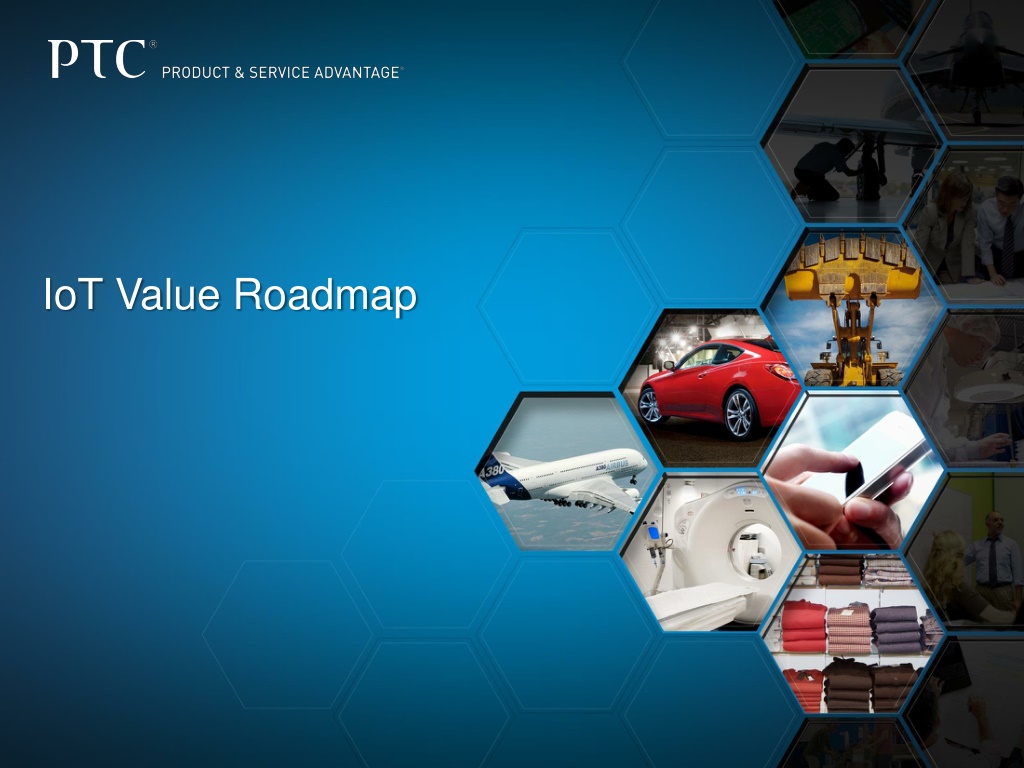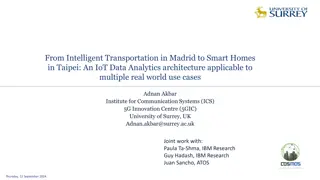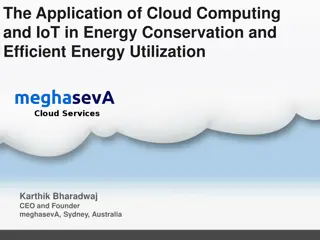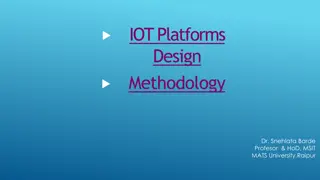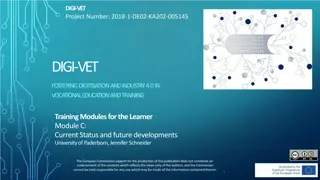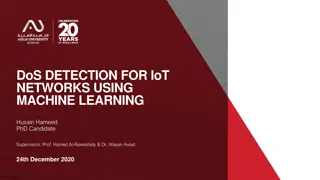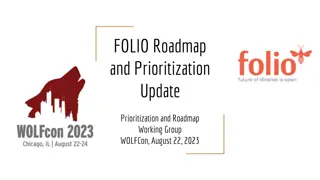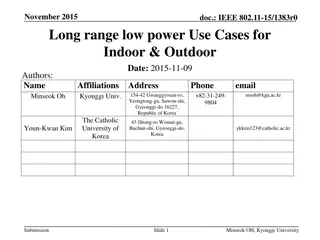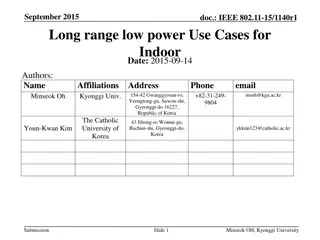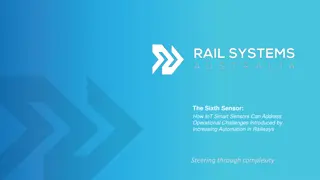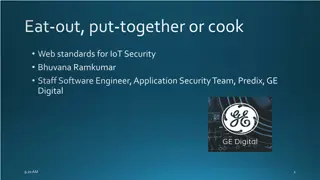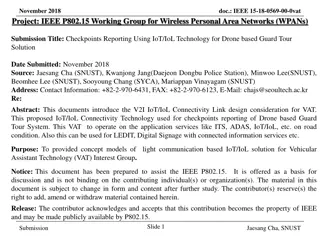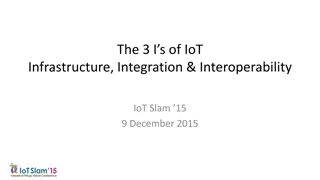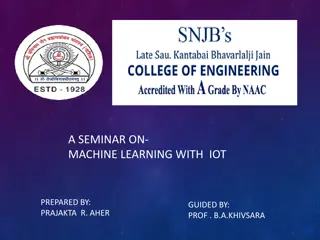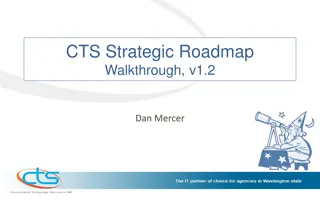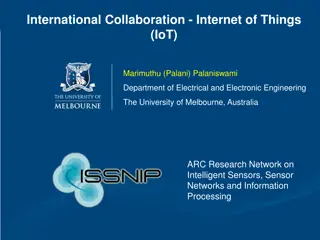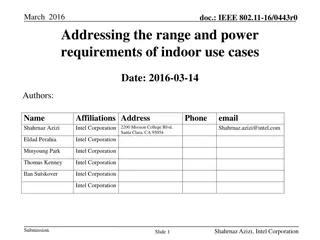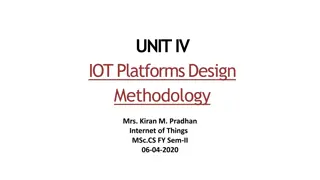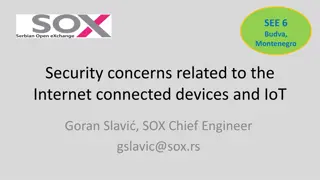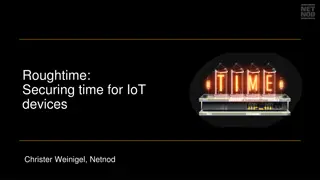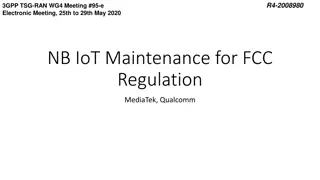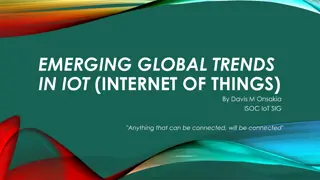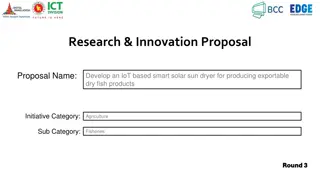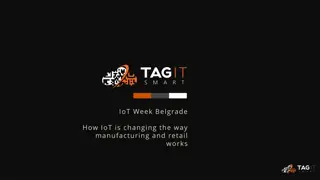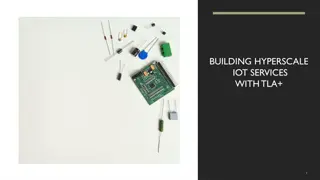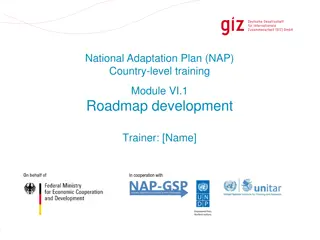IoT Value Roadmap and Key Use Cases Across Business Functions
In the realm of IoT, having a clear roadmap and understanding key use cases is fundamental for success. The IoT Value Roadmap outlines how IoT use cases impact business operations and drive business value. It highlights drivers such as optimizing operational performance, improving risk management, reducing costs, enhancing customer experience, and enabling new revenue streams. Additionally, the document identifies 26 key IoT use cases across various business functions like information technology, marketing, sales, product development, operations, manufacturing, and customer service. These use cases cover areas such as customer insights, connected product analysis, asset tracking, monitoring and diagnostics, flexible connectivity, security management, and more, leading to improvements in operations, maintenance, data integration, and service planning.
Download Presentation

Please find below an Image/Link to download the presentation.
The content on the website is provided AS IS for your information and personal use only. It may not be sold, licensed, or shared on other websites without obtaining consent from the author. Download presentation by click this link. If you encounter any issues during the download, it is possible that the publisher has removed the file from their server.
E N D
Presentation Transcript
IoT Value Roadmap Key IoT use cases from hundreds of customer interactions across connected products, operations, and systems are defined and linked to their business impact 2
IoT Value Drivers Optimize Operational Performance Optimize Operational Performance Improve Risk Management Operational Effectiveness Improve Risk Management Reduce Product and Service Costs Reduce Product and Service Costs Improve Customer Experience Improve Customer Experience Differentiate Product and Service Offering Strategic Differentiate Product and Service Offering Differentiation Enable New Revenue Streams Enable New Revenue Streams 3
26 Key IoT Use Cases Across Business Functions INFORMATION / OPERATIONAL TECHNOLOGY MARKETING / SALES PRODUCT DEVELOPMENT OPERATIONS / MANUFACTURING SERVICE / SUPPORT CUSTOMER Customer Insights and Opportunities Connected Product Usage Analysis Asset and Material Tracking Monitoring and Diagnostics Flexible Product and Asset Connectivity Flexible Product and Asset Connectivity Usage and Performance Dashboard Monitoring and Diagnostics Customer Insights and Opportunities Connected Product Usage Analysis Asset and Material Tracking Usage and Performance Dashboard Identity and Security Management Connected Operations Intelligence Remote Service Identity and Security Management Connected Operations Intelligence Flexible Billing and Pricing Models Connected Product Quality Analysis Remote Service Flexible Billing and Pricing Models Connected Product Quality Analysis Customer Self-Service Customer Self-Service Automated Service Execution Automated Service Execution Scalable IoT Operations Management Scalable IoT Operations Management New Value Added Services Connected Software Management Unified Key Performance Indicators New Value Added Services Connected Software Management Unified Key Performance Indicators Product Personalization Product Personalization Condition-Based Predictive Maintenance Condition-Based Predictive Maintenance Seamless IoT Data Integration Seamless IoT Data Integration Real-Time Asset Health Monitoring Real-Time Asset Health Monitoring Connected Service Parts Planning Automated Analytics and Actions Connected Service Parts Planning Automated Analytics and Actions Operations Management Improvements Operations Management Improvements Warranty Cost Management Rapid IoT Application Development Warranty Cost Management Rapid IoT Application Development 4
Optimize Operational Performance Combine real-time data from assets, enterprise systems, and people to increase operational efficiency of equipment, plants and logistics INFORMATION / OPERATIONAL TECHNOLOGY MARKETING / SALES PRODUCT DEVELOPMENT OPERATIONS / MANUFACTURING SERVICE / SUPPORT CUSTOMER Scalable IoT Operations Management Scalable IoT Operations Management Asset and Material Tracking Connected Service Parts Planning Asset and Material Tracking Connected Service Parts Planning Connected Operations Intelligence Condition-based Predictive Maintenance Connected Operations Intelligence Condition-based Predictive Maintenance Seamless IoT Data Integration Seamless IoT Data Integration Unified Key Performance Indicators Unified Key Performance Indicators Real-Time Asset Health Monitoring Real-Time Asset Health Monitoring Operations Management Improvements Operations Management Improvements 5
Improve Risk Management Improve ability to proactively identify and mitigate financial, safety, environmental, and regulatory compliance risk INFORMATION / OPERATIONAL TECHNOLOGY MARKETING / SALES PRODUCT DEVELOPMENT OPERATIONS / MANUFACTURING SERVICE / SUPPORT CUSTOMER Connected Product Usage Analysis Asset and Material Tracking Monitoring and Diagnostics Flexible Product and Asset Connectivity Flexible Product and Asset Connectivity Connected Product Usage Analysis Asset and Material Tracking Monitoring and Diagnostics Connected Product Quality Analysis Warranty Cost Management Identity and Security Management Connected Operations Intelligence Connected Product Quality Analysis Warranty Cost Management Identity and Security Management Connected Operations Intelligence Scalable IoT Operations Management Scalable IoT Operations Management Real-Time Asset Health Monitoring Real-Time Asset Health Monitoring Seamless IoT Data Integration Seamless IoT Data Integration 6
Reduce Product and Service Costs Implement proactive service, limit warranty costs and risks, and optimize service and product development processes INFORMATION / OPERATIONAL TECHNOLOGY MARKETING / SALES PRODUCT DEVELOPMENT OPERATIONS / MANUFACTURING SERVICE / SUPPORT CUSTOMER Connected Product Usage Analysis Real-Time Asset Health Monitoring Monitoring and Diagnostics Automated Analytics and Actions Customer Self-Service Automated Analytics and Actions Customer Self-Service Connected Product Usage Analysis Real-Time Asset Health Monitoring Monitoring and Diagnostics Remote Service Remote Service Rapid IoT Application Development Connected Product Quality Analysis Rapid IoT Application Development Connected Product Quality Analysis Automated Service Execution Automated Service Execution Connected Software Management Connected Software Management Condition-Based Predictive Maintenance Condition-Based Predictive Maintenance Connected Service Parts Planning Connected Service Parts Planning Warranty Cost Management Warranty Cost Management 7
Improve Customer Experience Make products smarter, easier to update, and more personalized to improve customer experience and value INFORMATION / OPERATIONAL TECHNOLOGY MARKETING / SALES PRODUCT DEVELOPMENT OPERATIONS / MANUFACTURING SERVICE / SUPPORT CUSTOMER New Value Added Services Connected Software Management Asset and Material Tracking Monitoring and Diagnostics Automated Analytics and Actions Usage and Performance Dashboard Automated Analytics and Actions Monitoring and Diagnostics New Value Added Services Connected Software Management Asset and Material Tracking Usage and Performance Dashboard Remote Service Remote Service Rapid IoT Application Development Rapid IoT Application Development Customer Self-Service Customer Self-Service Automated Service Execution Automated Service Execution Product Personalization Product Personalization 8
Differentiate Product and Service Offering Quickly deliver compelling, differentiated products and services that meet or anticipate customer demands INFORMATION / OPERATIONAL TECHNOLOGY MARKETING / SALES PRODUCT DEVELOPMENT OPERATIONS / MANUFACTURING SERVICE / SUPPORT CUSTOMER Customer Insights and Opportunities Connected Product Usage Analysis Automated Service Execution Rapid IoT Application Development Usage and Performance Dashboard Customer Insights and Opportunities Connected Product Usage Analysis Automated Service Execution Rapid IoT Application Development Usage and Performance Dashboard Flexible Billing and Pricing Models Connected Product Quality Analysis Flexible Billing and Pricing Models Connected Product Quality Analysis Customer Self-Service Customer Self-Service New Value Added Services Connected Software Management New Value Added Services Connected Software Management Product Personalization Product Personalization 9
Enable New Revenue Streams Maximize revenue opportunities and value capture from new services or new business models INFORMATION / OPERATIONAL TECHNOLOGY MARKETING / SALES PRODUCT DEVELOPMENT OPERATIONS / MANUFACTURING SERVICE / SUPPORT CUSTOMER Customer Insights and Opportunities Rapid IoT Application Development Usage and Performance Dashboard Customer Insights and Opportunities Rapid IoT Application Development Usage and Performance Dashboard Flexible Billing and Pricing Models Flexible Billing and Pricing Models Product Personalization Product Personalization New Value Added Services New Value Added Services 10
Customer Insights and Opportunities Description Collect and analyze product usage, condition, and consumable data to anticipate customer needs, automatically trigger alerts for cross-sell and up-sell opportunities, forecast future purchases, and create new consumable resupply models. Value Drivers Differentiate Product and Service Offering Enable New Revenue Streams Current State Slow pace of product and service innovation Inefficient identifying up-sell and cross-sell opportunities Losing market share to new or low cost competitors Measures Market share / growth (%) ($) Upsell revenue; cross-sell revenue ($) Increased product / service revenue or margin (%) Customer satisfaction, net promoter score (#) Product / Asset / Equipment utilization rate (%) Time to market MARKETING / SALES 11 11
Flexible Billing and Pricing Models Description Integrate product usage and performance data to enable usage, performance, or outcome based pricing and subscription models that create disruptive business models, and increase value captured and market penetration opportunities. Value Drivers Differentiate Product and Service Offering Enable New Revenue Streams Current State Inability to differentiate offering or enter new markets Losing market share to new or low cost competitors Measures Market share / growth (%) ($) Increased product / service revenue or margin (%) Service contract renewal rate (%) Connected products or assets under management (#) Number of users, logins, data views (#) MARKETING / SALES 12 12
New Value Added Services Description Aggregate data from products across the installed base and combine it with domain expertise to provide information, advisory, and managed services that enhance the customer s operation of the product or understanding of their business. Value Drivers Improve Customer Experience Differentiate Product and Service Offering Enable New Revenue Streams Current State Slow pace of product and service innovation Inability to differentiate offering or enter new markets Measures Market share / growth (%) ($) Upsell revenue; cross-sell revenue ($) Increased product / service revenue or margin (%) Number of users, logins, data views (#) MARKETING / SALES 13 13
Connected Product Usage Analysis Description Analyze and benchmark product performance and usage data collected through remote connectivity with sensor-equipped products or systems to inform and improve product requirements definition, prioritization of features, options and variants, market segmentation, life cycle costs, and supply chain coordination and planning. Value Drivers Improve Risk Management Reduce Product and Service Costs Differentiate Product and Service Offering Current State Inefficient identifying up-sell and cross-sell opportunities Inability to identify and manage the configuration of fielded products, systems, and assets Limited visibility into product performance, usage, environment, and quality Measures Upsell revenue; cross-sell revenue ($) Customer satisfaction, net promoter score (#) R&D / Sales / Manufacturing / Service Costs ($) Equipment up-time / product quality (%) Product / Asset / Equipment utilization rate (%) PRODUCT DEVELOPMENT 14 14
Connected Product Quality Analysis Description Continuously analyze field data collected through remote connectivity with sensor-equipped products or systems to improve root cause analysis and corrective actions, product quality, reliability and safety, preventive maintenance, and service. Value Drivers Improve Risk Management Reduce Product and Service Costs Differentiate Product and Service Offering Current State Limited visibility into product performance, usage, environment, and quality Poor capture and management of quality-related feedback causing repeated problems Difficult to track quality and identify root cause Rising service and warranty costs Poor product / equipment performance or unscheduled downtime Measures Product failure rate (e.g. MTBF, mean time between failure) (%) Number of recalls, warning letters, and audits (#) Customer satisfaction, net promoter score (#) R&D / Sales / Manufacturing / Service Costs ($) Equipment up-time / product quality (%) Warranty costs ($) PRODUCT DEVELOPMENT 15 15
Connected Software Management Description Remotely identify and manage the as-maintained configuration of fielded products, systems and assets; control the release of software updates and security patches by securely distributing packages of software files and instructions remotely. Value Drivers Reduce Product and Service Costs Improve Customer Experience Differentiate Product and Service Offering Current State Slow pace of product and service innovation Inability to identify and manage the configuration of fielded products, systems, and assets Rising service and warranty costs Poor product / equipment performance or unscheduled downtime Measures Product failure rate (e.g. MTBF, mean time between failure) (%) Number of recalls, warning letters, and audits (#) Mean time to repair (MTTR); resolution time Trips avoided; remote fix rate (#) (%) PRODUCT DEVELOPMENT 16 16
Asset and Material Tracking Description Easily locate and monitor key assets (e.g. raw materials, final products, and containers) to optimize logistics, maintain inventory levels, prevent quality issues, and detect theft. Value Drivers Optimize Operational Performance Improve Risk Management Improve Customer Experience Current State Limited visibility into product performance, usage, environment, and quality Inability to aggregate, analyze, and visualize operational intelligence across systems, assets, and people Low service level agreement (SLA) compliance Measures Upsell revenue; cross-sell revenue ($) R&D / Sales / Manufacturing / Service Costs ($) Write offs of missing assets or stock ($) OPERATIONS / MANUFACTURING 17 17
Connected Operations Intelligence Description Connect disparate silos of operational data (e.g. manufacturing, supplier, and logistics) into unified, real-time visibility across heterogeneous systems, people and assets to make faster and better decisions and improve operational performance. Value Drivers Optimize Operational Performance Improve Risk Management Current State Limited visibility into product performance, usage, environment, and quality Inability to quickly re-configure manufacturing systems and introduce new smart technologies Inability to get real-time correlated data from proprietary systems and heterogeneous equipment Difficult to incorporate data from existing business systems and external sources in IoT applications Difficult to track quality and identify root cause Measures Number of recalls, warning letters, and audits (#) Manufacturing cycle time; overall equipment effectiveness (OEE) Equipment up-time / product quality (%) Product / Asset / Equipment utilization rate (%) OPERATIONS / MANUFACTURING 18 18
Unified Key Performance Indicators Description Aggregate and contextualize data from isolated manufacturing systems and assets into actionable web and mobile applications that provide role-based views into key indicators, while also allowing drill- down into correlated data to diagnose problems more quickly and improve performance. Value Drivers Optimize Operational Performance Current State Limited visibility into product performance, usage, environment, and quality Inability to get real-time correlated data from proprietary systems and heterogeneous equipment Difficult to incorporate data from existing business systems and external sources in IoT applications Difficult to track quality and identify root cause Measures Product failure rate (e.g. MTBF, mean time between failure) (%) Number of recalls, warning letters, and audits (#) Manufacturing cycle time; overall equipment effectiveness (OEE) Equipment up-time / product quality (%) OPERATIONS / MANUFACTURING 19 19
Real-Time Asset Health Monitoring Description Minimize downtime and avoid potential equipment failures by enabling detailed monitoring of critical equipment condition and operating parameters to automatically trigger alerts and proactively initiate response from maintenance teams or OEM service networks when problems are detected. Value Drivers Optimize Operational Performance Improve Risk Management Reduce Product and Service Costs Current State Limited visibility into product performance, usage, environment, and quality Inability to get real-time correlated data from proprietary systems and heterogeneous equipment Poor capture and management of quality-related feedback causing repeated problems Difficult to track quality and identify root cause Rising service and warranty costs Poor product / equipment performance or unscheduled downtime Measures R&D / Sales / Manufacturing / Service Costs ($) Manufacturing cycle time; overall equipment effectiveness (OEE) Equipment up-time / product quality (%) Mean time to repair (MTTR); resolution time No problem found (%) OPERATIONS / MANUFACTURING 20 20
Operations Management Improvements Description Quickly improve how complex processes are monitored, managed, and optimized, and accelerate smart factory and Industry 4.0 initiatives, by extending existing equipment and ERP/MES systems with connectivity, interoperability, mobility, and crowd sourced intelligence. Value Drivers Optimize Operational Performance Current State Inability to quickly re-configure manufacturing systems and introduce new smart technologies Inability to get real-time correlated data from proprietary systems and heterogeneous equipment Difficult to incorporate data from existing business systems and external sources in IoT applications Poor capture and management of quality-related feedback causing repeated problems Measures R&D / Sales / Manufacturing / Service Costs ($) Manufacturing cycle time; overall equipment effectiveness (OEE) Product / Asset / Equipment utilization rate (%) OPERATIONS / MANUFACTURING 21 21
Monitoring and Diagnostics Description Interact with connected products to identify and diagnose product issues remotely to eliminate unnecessary service calls and improve first time fix rate. Value Drivers Improve Risk Management Reduce Product and Service Costs Improve Customer Experience Current State Inefficient identifying up-sell and cross-sell opportunities Limited visibility into product performance, usage, environment, and quality Difficult to track quality and identify root cause Inability to hire and retain skilled technical staff Rising service and warranty costs Poor product / equipment performance or unscheduled downtime Low service level agreement (SLA) compliance Measures Mean time to repair (MTTR); resolution time No problem found (%) First time fix rate (FTFR) SLA compliance (%) SERVICE / SUPPORT 22 22
Remote Service Description Interact real-time with connected products to perform remote service activities including machine adjustments, software updates, and self-tests to avoid downtime and eliminate need for on-site service calls. Value Drivers Reduce Product and Service Costs Improve Customer Experience Current State Inability to differentiate offering or enter new markets Inability to identify and manage the configuration of fielded products, systems, and assets Difficult to track quality and identify root cause Inability to hire and retain skilled technical staff Rising service and warranty costs Poor product / equipment performance or unscheduled downtime Low service level agreement (SLA) compliance Measures R&D / Sales / Manufacturing / Service Costs ($) Equipment up-time / product quality (%) Mean time to repair (MTTR); resolution time Service contract renewal rate (%) No problem found (%) First time fix rate (FTFR) Trips avoided; remote fix rate (#) (%) SLA compliance (%) SERVICE / SUPPORT 23 23
Automated Service Execution Description Automatically trigger service events based on preemptive connected product alerts, diagnose issues, determine the best service response and dispatch technicians based on SLA entitlements and resource availability. Value Drivers Reduce Product and Service Costs Improve Customer Experience Differentiate Product and Service Offering Current State Inability to hire and retain skilled technical staff Rising service and warranty costs Poor product / equipment performance or unscheduled downtime Low service level agreement (SLA) compliance Measures Customer satisfaction, net promoter score (#) R&D / Sales / Manufacturing / Service Costs ($) Mean time to repair (MTTR); resolution time Service contract renewal rate (%) First time fix rate (FTFR) Trips avoided; remote fix rate (#) (%) SLA compliance (%) SERVICE / SUPPORT 24 24
Condition-based Predictive Maintenance Description Monitor connected product operating characteristics and combine with thresholds, trends, and analytics to move from reactive to proactive maintenance. Value Drivers Optimize Operational Performance Reduce Product and Service Costs Current State Limited visibility into product performance, usage, environment, and quality Difficult to track quality and identify root cause Inability to hire and retain skilled technical staff Rising service and warranty costs Poor product / equipment performance or unscheduled downtime Measures Product failure rate (e.g. MTBF, mean time between failure) (%) Equipment up-time / product quality (%) Product / Asset / Equipment utilization rate (%) Mean time to repair (MTTR); resolution time Service contract renewal rate (%) SLA compliance (%) SERVICE / SUPPORT 25 25
Connected Service Parts Planning Description Leverage connected product data including configuration, utilization, and location to improve balancing of service level objectives with service parts inventory levels. Value Drivers Optimize Operational Performance Reduce Product and Service Costs Current State Rising service and warranty costs Low service level agreement (SLA) compliance Measures Write offs of missing assets or stock ($) First time fix rate (FTFR) SLA compliance (%) SERVICE / SUPPORT 26 26
Warranty Cost Management Description Continually monitor connected product usage to identify and prevent potential warranty compliance issues; automatically notify operator when compliance issues occur to avoid potential product failures and reduce warranty cost. Value Drivers Improve Risk Management Reduce Product and Service Costs Current State Poor capture and management of quality-related feedback causing repeated problems Difficult to track quality and identify root cause Rising service and warranty costs Measures Number of recalls, warning letters, and audits (#) R&D / Sales / Manufacturing / Service Costs ($) Warranty costs ($) No problem found (%) Trips avoided; remote fix rate (#) (%) SERVICE / SUPPORT 27 27
Flexible Product and Asset Connectivity Description Leverage proven agent technology and connectivity services to easily and flexibly connect to any wired or wireless asset via third-party device clouds, direct network connections, open APIs or edge devices. Value Drivers Improve Risk Management Reduce Product and Service Costs Current State Slow pace of product and service innovation Inability to quickly re-configure manufacturing systems and introduce new smart technologies Inability to hire and retain skilled technical staff Increasing demand for new views into production / operation data Inability to securely connect products and manage and analyze data Internal development of IoT projects are slow and costly Measures R&D / Sales / Manufacturing / Service Costs ($) Time to market Connected products or assets under management (#) INFORMATION / OPERATIONAL TECHNOLOGY 28 28
Identity and Security Management Description Provide secure real-time bidirectional communication with devices and ensure compliance with policy management for access control, logging, and auditing of interactions with connected products and assets. Value Drivers Improve Risk Management Reduce Product and Service Costs Current State Inability to securely connect products and manage and analyze data Internal development of IoT projects are slow and costly Existing IoT solutions unable to scale or meet new data requirements Measures R&D / Sales / Manufacturing / Service Costs ($) Time to market Number of users, logins, data views (#) INFORMATION / OPERATIONAL TECHNOLOGY 29 29
Scalable IoT Operations Management Description Establish a highly scalable system for provisioning and deploying large numbers of products and assets, managing complex event processing and Big Data, and operating in an evolving and heterogeneous environment. Value Drivers Optimize Operational Performance Improve Risk Management Current State Inability to securely connect products and manage and analyze data Internal development of IoT projects are slow and costly Existing IoT solutions unable to scale or meet new data requirements Measures R&D / Sales / Manufacturing / Service Costs ($) Time to market Connected products or assets under management (#) INFORMATION / OPERATIONAL TECHNOLOGY 30 30
Seamless IoT Data Integration Description Rapidly integrate with enterprise data from business systems, time series data from connected things, and unstructured feedback from people to rapidly respond to changing business requirements and uncover actionable insights. Value Drivers Optimize Operational Performance Improve Risk Management Current State Inability to get real-time correlated data from proprietary systems and heterogeneous equipment Difficult to incorporate data from existing business systems and external sources in IoT applications Internal development of IoT projects are slow and costly Existing IoT solutions unable to scale or meet new data requirements Measures R&D / Sales / Manufacturing / Service Costs ($) Time to market Number of users, logins, data views (#) INFORMATION / OPERATIONAL TECHNOLOGY 31 31
Automated Analytics and Actions Description Establish rules, business logic, and algorithms that analyze and correlate unstructured, time-series, and transactional data to optimize business processes and discover new opportunities and insights that answer key business questions. Value Drivers Reduce Product and Service Costs Improve Customer Experience Current State Limited visibility into product performance, usage, environment, and quality Inability to securely connect products and manage and analyze data Internal development of IoT projects are slow and costly Existing IoT solutions unable to scale or meet new data requirements Measures R&D / Sales / Manufacturing / Service Costs ($) No problem found (%) Trips avoided; remote fix rate (#) (%) Time to market INFORMATION / OPERATIONAL TECHNOLOGY 32 32
Rapid IoT Application Development Description Leverage an IoT platform with a model-based application development environment to reduce the time, cost, and risk required to build and maintain innovative connected applications that differentiate products and services and provide a competitive edge. Value Drivers Reduce Product and Service Costs Improve Customer Experience Differentiate Product and Service Offering Enable New Revenue Streams Current State Slow pace of product and service innovation Inability to hire and retain skilled technical staff Increasing demand for new views into production / operation data Internal development of IoT projects are slow and costly Measures Increased product / service revenue or margin (%) Time to market Number of users, logins, data views (#) INFORMATION / OPERATIONAL TECHNOLOGY 33 33
Usage and Performance Dashboard Description Enable customer to monitor and track the usage and performance of their products or benchmark with anonymized peers to optimize the value they extract. Value Drivers Improve Customer Experience Differentiate Product and Service Offering Enable New Revenue Streams Current State Inability to differentiate offering or enter new markets Limited visibility into product performance, usage, environment, and quality Increasing demand for new views into production / operation data Measures Upsell revenue; cross-sell revenue ($) Increased product / service revenue or margin (%) Customer satisfaction, net promoter score (#) Product / Asset / Equipment utilization rate (%) Service contract renewal rate (%) Number of users, logins, data views (#) CUSTOMER 34 34
Customer Self-Service Description Enable customers to quickly diagnose and resolve issues themselves by suggesting actions based on connected product data to maximize product availability. Value Drivers Reduce Product and Service Costs Improve Customer Experience Differentiate Product and Service Offering Current State Inability to differentiate offering or enter new markets Losing market share to new or low cost competitors Rising service and warranty costs Poor product / equipment performance or unscheduled downtime Measures Customer satisfaction, net promoter score (#) Warranty costs ($) Trips avoided; remote fix rate (#) (%) Number of users, logins, data views (#) CUSTOMER 35 35
Product Personalization Description Enable personalization capabilities by allowing users to remotely add features or change parameters to enhance their user experience and product performance. Value Drivers Improve Customer Experience Differentiate Product and Service Offering Enable New Revenue Streams Current State Inability to differentiate offering or enter new markets Losing market share to new or low cost competitors Inability to identify and manage the configuration of fielded products, systems, and assets Measures Increased product / service revenue or margin (%) Customer satisfaction, net promoter score (#) Number of users, logins, data views (#) CUSTOMER 36 36
Connected Product Usage Analysis Case Study Challenges The company was looking to have a smooth implementation but didn t have the required technical resources with Apache and PTC Windchill skills inhouse From previous experience the decision-makers knew that a PLM implementation could be a complex project and that they needed skilled resources to guarantee PTC Windchill FlexPLM would run at optimal performance and stability. However, they were looking to buy this expertise and not build it internally in order to get a headstart Founded in 1926, Colony Brands quickly evolved to one of the world s largest and most successful catalog companies, employing over 4,500 people. Colony Brands successfully implemented PTC Windchill FlexPLM in the Cloud which aligns with their overall IT strategy to move all hardware and application management into the Cloud. Value Drivers Colony Brands had developed a risk management plan for implementing PTC Windchill FlexPLM which relies on leveraging PTC Cloud Services taking over the application management (AMS) of the system. By having experts configure, tune, and support the system, they would be able to avoid performance issues or creating an unstable system Apart from one 10-minute outage that was needed to update security certificates, we haven t seen any disruptions in the 15 months since we moved to the PTC Cloud. Carrie Baumhover Company photo here Colony Brands 38 38
